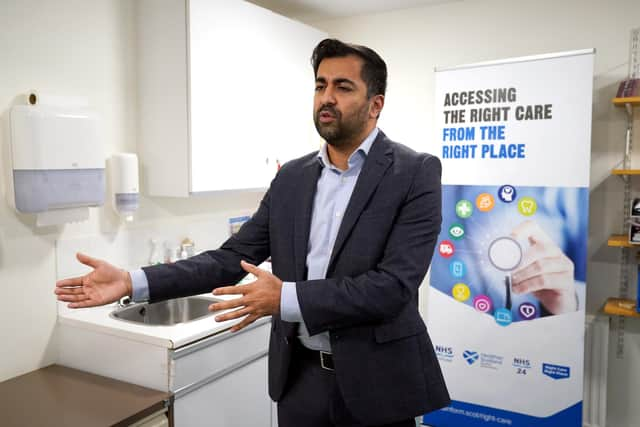NHS vacancies: GPs are at 'tipping point' with some practices 'collapsing', according to top medic
According to new figures, the estimated number of whole-time equivalent (WTE) GPs in Scotland has fallen from 3,613 in 2019 to 3,494 this year.
Last week, the British Medical Association (BMA) published damning research into the impact of GP shortages for the workforce and patients, warning Scotland is around 1,000 GPs short.
Advertisement
Hide AdAdvertisement
Hide AdReacting to the latest GP workforce survey, Dr Andrew Buist, chair of BMA Scotland’s GP committee, said: “These are hugely worrying statistics that starkly illustrate the mismatch between demand and GP capacity in Scotland that we have warned of for some time.


“They show that the WTE number of GPs in Scotland has actually fallen by 3 per cent to the lowest level since this survey was first produced.
“Put simply – this means there is less GPs capacity available to care for the people of Scotland than at any point since 2009, at the exact time we are seeing substantial increases in demand for care – driven by an increasing and ageing population and ever lengthening waiting lists.
“It should be little surprise on that basis that some practices are collapsing, with GPs cutting hours or leaving the profession due to workload pressures and patients struggling to get the care they need.
“This is a vicious circle. As the more pressure increases, the less manageable or bearable working as a GP becomes for those left working in practices, forcing them in turn to cut hours or leave. I believe we really are at a tipping point for GPs and practices in every single area of the country and we need urgent action and support.”
Scottish Labour health spokesperson Jackie Baillie said: “It’s no wonder general practice is at breaking point in Scotland when pressures are piling up, but GP numbers are falling.
“The pandemic might have taken this crisis to new heights, but the SNP have been failing to act for years.
“They have ignored warning after warning, and have failed to provide the reassurance that they will deliver on their crucial pledge to increase GP numbers and that this in turn will be sufficient to relieve the pressures faced by primary care. Once again patients and staff are being badly let down by the SNP’s disastrous incompetence.
Advertisement
Hide AdAdvertisement
Hide Ad“[Health secretary] Humza Yousaf needs to get a grip on the chaos engulfing general practice before any more damage is done.”
Mr Yousaf said: “We remain committed to increasing the number of GPs in Scotland by at least 800 by 2027. I would like to repeat my thanks to all GP surgery staff who have worked tirelessly to support so many during the pandemic and as we start to recover from it.
“To support GP practices, we have recruited more than 3,220 healthcare professionals since 2018 and are committed to investing at least £170 million a year on growing primary care multi-disciplinary teams.
“We will increase the number of GP speciality training (GPST) places by 35 places in 2023. This is on the back of another successful round of recruitment this year with a 98 per cent fill rate. For comparison, there was an 86 per cent fill rate in 2020.”
Dr Buist added: “We have heard much from the Scottish Government around being on course to increase the GP workforce by 800 by 2027, but that aspiration needs to be matched with investment to grow the WTE workforce, so that capacity in general practice increases as we know it needs to.
“Unfortunately the lack of investment is being borne out in what we are seeing with these new figures. When the NHS increases the number of hospital posts, it expects to have to fund extra salaries for these extra staff, so it follows additional funding is required to increase GP numbers.
“We need urgent direct investment to allow GP recruitment. We need a focus on easing the workload burden driving so many out of the profession and we need recent funding cuts to be reversed.”
The figures were published as it was confirmed more than three quarters of a million Scots are waiting for an outpatient appointment, key tests or hospital treatment, with separate statistics showing a “staggering” 776,341 people on NHS waiting lists.
Advertisement
Hide AdAdvertisement
Hide AdOf the 616,396 patients who are waiting either for an outpatient appointment or for inpatient or day case treatment, there are 73,284 who have been waiting a year or more.
New figures, released by Public Health Scotland (PHS), also showed at the end of September there were 159,945 people waiting for diagnostic tests.
PHS’s figures did show a fall in the numbers of patients experiencing the longest waits of two years or more for either hospital treatment or to be seen as an outpatient.
This was welcomed by Mr Yousaf, but he accepted the “picture continues to be extremely tough, particularly as we head into winter”.
His comments came as official figures showed that as of September 30 this year there were 474,600 people waiting to be seen as outpatients – a total 54 per cent larger than the quarterly average in 2019, prior to the coronavirus pandemic.
The national standard in Scotland states 95 per cent of new outpatients should wait no longer than 12 weeks from referral to being seen.
Scottish Conservative health spokesman Dr Sandesh Gulhane branded the “shameful figures” a “ticking timebomb” – as he continued to call for Mr Yousaf to be axed.
Dr Gulhane said: “It’s staggering that the number of patients waiting in NHS backlogs has now reached over three quarters of a million.
“Any delay to getting a diagnosis or starting treatment can lead to a patient going downhill rapidly, at the very least prolonging their suffering – and at worse leading to avoidable deaths."
Comments
Want to join the conversation? Please or to comment on this article.